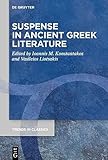Suspense in Ancient Greek Literature / ed. by Ioannis M. Konstantakos, Vasileios Liotsakis.
Material type: TextSeries: Trends in Classics - Supplementary Volumes ; 113Publisher: Berlin ; Boston : De Gruyter, [2021]Copyright date: ©2021Description: 1 online resource (VIII, 441 p.)Content type:
TextSeries: Trends in Classics - Supplementary Volumes ; 113Publisher: Berlin ; Boston : De Gruyter, [2021]Copyright date: ©2021Description: 1 online resource (VIII, 441 p.)Content type: - 9783110715392
- 9783110715583
- 9783110715521
- PA3061 .S88 2021
- online - DeGruyter
- Issued also in print.
| Item type | Current library | Call number | URL | Status | Notes | Barcode | |
|---|---|---|---|---|---|---|---|
 eBook
eBook
|
Biblioteca "Angelicum" Pont. Univ. S.Tommaso d'Aquino Nuvola online | online - DeGruyter (Browse shelf(Opens below)) | Online access | Not for loan (Accesso limitato) | Accesso per gli utenti autorizzati / Access for authorized users | (dgr)9783110715521 |
Frontmatter -- Preface -- Contents -- Introduction -- Part I: Literary Criticism -- ἵν’ ὁ θεατὴς προσδοκῶν καθῇτο: What Did Ancient Critics Know of ‘Suspense’? -- Part II: Archaic Poetry -- Homeric Suspense -- Suspense, Orality, and Hymnic Narrative: The Case of the Homeric Hymns -- Part III: Tragedy -- Waiting for Xerxes: Information Economics and the Composition of a Suspense Plot out of Familiar Events in Aeschylus’ Persae -- Narrative Suspense in Sophocles: The Moral Perplexity of Duelling Narratives in Philoctetes -- Affective Suspense in Euripides’ Ion -- Part IV: Comedy -- Staged Suspense: Scenic Spectacle, Anxious Expectation, and Dramatic Enthralment in Aristophanic Theatre -- Part V: Historiography -- Suspense in Herodotus’ Narrative of the Battle of Thermopylae -- The Thucydidean Question, Structuralism, and ‘Neo-Unitarianism’: Near Misses and Suspense in the History -- Suspense in Conspiracy Narratives: Polybius and Appian -- Part VI: Oratory -- Suspense in Lysias -- Narrative and Suspense in Public Forensic Orations -- Part VII: Novel -- Suspense in the Ancient Greek Novel -- Bibliography -- List of Contributors -- Index Νominum et Rerum -- Index Locorum
restricted access online access with authorization star
http://purl.org/coar/access_right/c_16ec
The use of suspense in ancient literature attracts increasing attention in modern scholarship, but hitherto there has been no comprehensive work analysing the techniques of suspense through the various genres of the Classical literary canon. This volume aspires to fill such a gap, exploring the phenomenon of suspense in the earliest narrative writings of the western world, the literature of the ancient Greeks. The individual chapters focus on a wide range of poetic and prose genres (epic, drama, historiography, oratory, novel, and works of literary criticism) and examine the means by which ancient authors elicited emotions of tense expectation and fearful anticipation for the outcome of the story, the development of the plot, or the characters' fate. A variety of theoretical tools, from narratology and performance studies to psychological and cognitive approaches, are exploited to study the operation of suspense in the works under discussion. Suspenseful effects are analysed in a double perspective, both in terms of the artifices employed by authors and with regard to the responses and experiences of the audience. The volume will be useful to classical scholars, narratologists, and literary historians and theorists.
Issued also in print.
Mode of access: Internet via World Wide Web.
In English.
Description based on online resource; title from PDF title page (publisher's Web site, viewed 28. Feb 2023)


